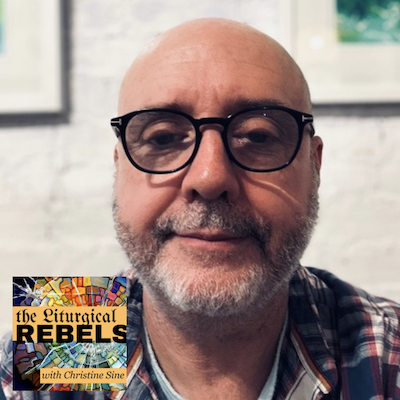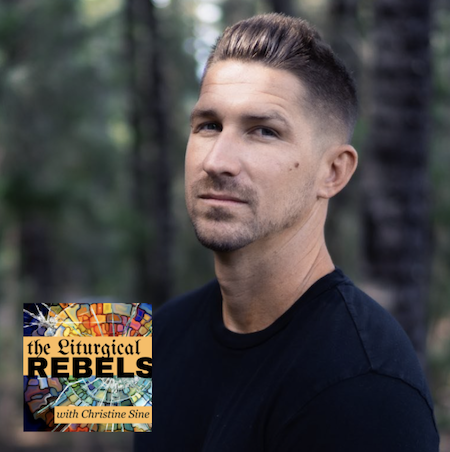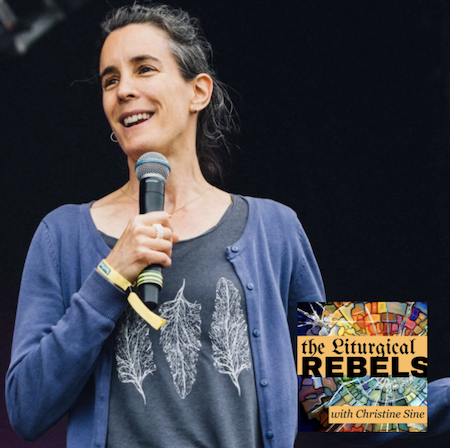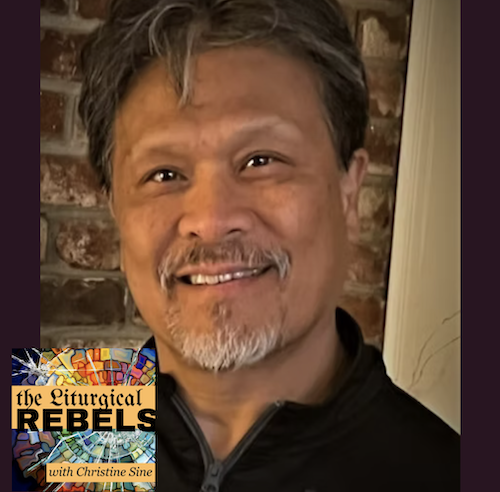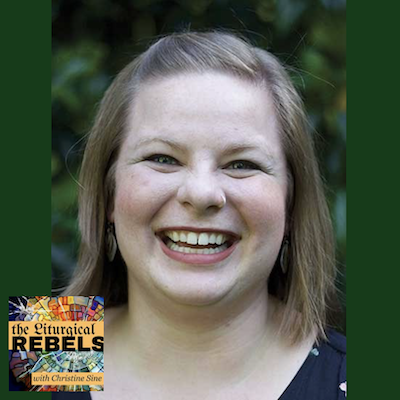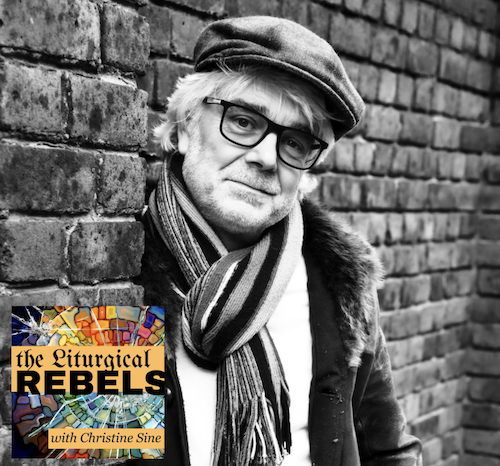In this conversation, Ian Mobsby shares his transformative journey from a liberal atheist background to embracing the Christian faith. He discusses his involvement in alternative worship and missional communities, emphasizing the importance of building relationships and fostering spiritual journeys. The conversation delves into the rise of contemplative spirituality, highlighting its appeal to both churchgoers and those outside the faith. Ian presents a contemplative approach to mission, focusing on God’s work of restoration rather than human manipulation. The cyclical nature of spiritual growth and the transformative power of the contemplative tradition in Christianity is explored. They delve into the concept of being ‘spiritual but not religious’ and the need for a shift from traditional hierarchical models of church leadership to a more community-oriented approach.
Ian can be found at
- Personal Website: https://www.ianmobsby.net
- Facebook: https://www.facebook.com/ian.mobsby
- Substack: https://postsecularcontemplative.substack.com
- BlueSky: https://bsky.app/profile/ianjmobsby.bsky.social
- Linked In: https://www.linkedin.com/in/ian-mobsby-8ab7a3b/
In this episode of the Liturgical Rebels podcast, Kevin Sweeney shares his transformative journey from a conservative Christian background to a more progressive and radical perspective. He discusses the significance of the Black prophetic tradition in shaping his faith and the importance of understanding the Cosmic Christ as a universal force. The conversation also delves into the role of the Concrete Jesus in calling believers to action and the limitations of traditional creeds in addressing love, justice, and liberation. In this conversation, Christine Sine and Kevin explore the significance of embodiment in faith, the limitations of creeds, the transformative power of mysticism, and the practical implications of living out spiritual principles. They discuss how the creeds can create a disconnect between belief and action, and how the teachings of the mystics can guide individuals towards a more experiential understanding of God. The conversation emphasizes the importance of love, community, and personal transformation in the journey of faith.
Takeaways
- Kevin’s graduation moment symbolized a challenge to institutionalized white supremacy.
- The Black prophetic tradition profoundly shaped Kevin’s Christian imagination.
- Experiencing God can happen outside traditional church settings.
- The Cosmic Christ represents a universal force present in all creation.
- Creation itself is seen as the first incarnation of Christ.
- The Concrete Jesus emphasizes action and involvement in the world.
- Faith should be about transformation and direct experience with God. The creeds focus on beliefs but neglect embodiment.
- Abstract beliefs can lead to a disconnect from action.
- Mystics offer a deeper, experiential understanding of God.
- Being seen by God liberates us from seeking validation from others.
- The cosmic Christ invites us to trust in a loving reality.
- Personal transformation is rooted in direct experiences of God.
- Community and love are central to the Christian journey.
Kevin Sweeney was co-founder and lead pastor of Imagine Church for almost ten years. Imagine was an urban church in Honolulu that was welcoming of all people and committed to leading the church into the future. Kevin was co-founder of the Honolulu based creative collective The (un)Commons, spoke at Hawai’i Contemporary’s premier art Biennial, and helped lead “Saying Grace,” a curated gathering of dinners and stories between the church and the LGBTQ community in Honolulu. After receiving Masters Degrees in Theology and Intercultural Studies (with a focus on Black and Womanist theology) Kevin is fascinated with and committed to creating environments for creativity, cultural innovation, social healing, communal cohesiveness, and personal transformation.
Kevin is the host of podcast “The Church Needs Therapy” and is a best selling author. His three books are “The Cosmic Christ and the Concrete Jesus”, “The Making of a Mystic: My Journey with Mushrooms, My Life as a Pastor, and Why It’s Okay For Everyone to Relax,” and “The Joy of Letting Go.” He currently lives and surfs in Honolulu with his wife and co-founder of Imagine, Christine, and their two kids, True and Mikayla.
You can connect with Kevin Sweeney at his website www.kevinsweeneynow.com or on Instagram
As an Amazon Associate I receive a small amount for purchases made through appropriate links. Thank you for supporting Godspace in this way.
In this conversation, Christine Sine and Forrest Inslee engage with Ruth Valerio, exploring her journey into Earth care and the integration of faith with environmentalism. Ruth shares her personal experiences and theological insights, emphasizing the interconnectedness of social justice and environmental issues. The discussion highlights the importance of simplicity in living, the role of the church in advocating for Earth care, and the need for individual action in addressing the climate crisis.
Ruth Valerio has a vision to inspire and equip people to a whole-life response to environmental breakdown and poverty, helping build a movement that brings about lasting change on the issues that impact the poorest and most vulnerable, and that creates a flourishing natural world. She is Programmes, Partnerships and Advocacy Director for Embrace the Middle East – an organisation that works to support Middle East Christians as they tackle poverty and injustice in vulnerable and marginalised communities.
She has a theology degree from Cambridge and a doctorate from Kings College London and holds honorary doctorates from the Universities of Winchester and Chichester and is Canon Theologian at Rochester Cathedral. She has written extensively on justice, environment and lifestyle issues. See her Publications pages for more information. Her Christian faith and spirituality are central to her life, and from this bedrock comes a deep desire to work for social justice, equality and ecological flourishing.
You can contact and learn more about Ruth Valerio at ruthvalerio.net
More about Forrest Inslee including contact information can be found at his website www.circlewood.online
Find out more about Christine Sine on
Walking In Wonder on Substack
and on her website Godspacelight
And on social media:
Instagram
Facebook
X
In this engaging conversation, Christine Sine and Al Tizon explore the complexities of identity, faith, and social justice. Al shares his experiences as a third culture kid and his transformative journey back to the Philippines as a missionary. They discuss the challenges of integrating theology with activism, the impact of classism, and the importance of solidarity with the marginalized. Al introduces six movements that can help individuals and communities live out the gospel in practical ways, emphasizing the need to confront comfort and embrace a life of service. The conversation concludes with reflections on the true essence of the Christian life and the call to prioritize God’s project over personal comfort.
Takeaways
- The term ‘third culture kid’ describes a unique identity shaped by multiple cultures.
- Returning to the Philippines was a transformative experience for Al Tizon.
- Classism is a significant issue that infiltrates and affects the church and society.
- The six movements towards solidarity can guide individuals in their faith journey.
- Community engagement is essential for living out the gospel.
- Comfort can often hinder true engagement.
- The church must respond to current social challenges with compassion and action.
- Life in Christ offers a richer fulfillment than the pursuit of comfort.
Rev. Dr. Al Tizon is lead pastor of Grace Fellowship Community Church in San Francisco, CA and affiliate professor of missional and global leadership at North Park Theological Seminary in Chicago, IL.
Al has engaged in community development, church leadership, advocacy, and urban ministry in the United States and in the Philippines. Previous positions he has held include executive minister of Serve Globally, the international ministries of the Evangelical Covenant Church denomination; holistic ministry director and then president of Christians for Social Action and associate professor of holistic ministry at Palmer Theological Seminary of Eastern University near Philadelphia, PA.
Al is the author or editor of seven books, including Whole & Reconciled: Gospel, Church, and Mission in a Fractured World (Baker Academic, 2018) and Christ Among the Classes: The Rich, the Poor, and the Mission of the Church (Orbis, 2023). Al received his BA in religious studies (1984) and his MA in church leadership studies (1987) from Vanguard University of Southern California (Costa Mesa, CA). He received his PhD in missiology from the Graduate Theological Union (2005, Berkeley, CA). Al is an ordained minister of the Evangelical Covenant Church.
Al and his wife Janice live in the San Francisco Bay Area, in close proximity to their four grown children and seven grandchildren.
You can learn more and contact Al on his website.
In this conversation, Christine Sine and Ruth discuss the intersection of theology, gender, and social justice. Ruth shares her personal history growing up in Argentina during a military dictatorship, which shaped her passion for peace and justice. They explore the challenges faced by women in theology, the importance of community living, and the role of environmental stewardship. The conversation also touches on the impact of political decisions on migration and refugee support, and concludes with a discussion on maintaining hope in chaotic times.
Takeaways
- Ruth’s personal history in Argentina shaped her passion for justice.
- The importance of community support for women in theology.
- Navigating gender issues in theological education is challenging.
- Intentional communities can foster hope and resilience.
- Environmental stewardship is a vital aspect of community life.
- Political decisions significantly impact migration and refugee support.
- God’s intent is for the flourishing of all creation.
- Hope can be nourished through community engagement.
- Theological work should reflect embodied commitments.
- Living out faith involves seeking justice and God’s reign.
Ruth yearns to see peace and justice embrace in the beautiful and broken world we call home. A wife of one and mother of many, theologian, missiologist, educator, and storyteller, she has been involved in leadership development and theological education for integral mission in her native Latin America for several decades. She teaches at Western Theological Seminary (https://www.westernsem.edu) land serves with the Comunidad de Estudios Teológicos Interdisciplinarios (CETI – www.ceticontinental.org, a learning community with students across Latin America), and with INFEMIT (International Fellowship for Mission as Transformation –www.infemit.org). She serves on the board of the Oxford Centre for Mission Studies and the American Society of Missiology. She lives with her husband, James, in Costa Rica as a member of Casa Adobe, an intentional Christian Community with deep concern for right living in relation to the whole of creation(www.casaadobe.org). Her studies include a Bachelors in Education (Argentina), an MA in Interdisciplinary Studies (Wheaton College), and a PhD in Theology (Boston University).
In this episode, Christine Sine and Kendall Vanderslice explore the spiritual significance of bread making, discussing its biblical roots, the art of baking as a form of prayer, and the importance of community and tradition in the practice. They delve into the liturgical aspects of bread, seasonal recipes, and how bread making can be a meaningful Lenten practice. The discussion also touches on the science of sourdough, its digestibility, and the rich history behind traditional breads like hot cross buns, emphasizing the transformative power of incorporating bread making into our busy lives.
Takeaways
- Bread making can be a spiritual practice.
- The first mention of bread in the Bible is significant.
- Baking bread can be a form of prayer.
- Liturgy provides a structure for baking bread.
- Seasonal recipes connect us to the church calendar.
- Sourdough baking can be a Lenten practice.
- Bread symbolizes God’s provision and presence.
- Incorporating bread making into life can foster rest.
Professional baker and practical theologian Kendall Vanderslice has spent a lot of time reflecting on the connection between the dough that clung to her hands at work and the bread blessed and pressed into her palm at church, ultimately seeing that they both were tangible reminders that God was with her and that God cared. Her most recent book is Bake and Pray: Liturgies and practices for baking bread as a spiritual practice.
Kendall can be reached at:
facebook
Instagram
As an Amazon Associate I receive a small amount for purchases made through appropriate links. Thank you for supporting Godspace in this way.
In this episode of the Liturgical Rebels podcast, Christine Sine interviews Greg Valerio, a pioneer in the fair trade jewelry movement. Valerio shares his unexpected journey into the world of fair trade gold, discussing the challenges and dangers he has faced while advocating for ethical practices in the jewelry industry. He emphasizes the importance of community engagement and the role of faith in driving social justice initiatives. The conversation also touches on the recognition Valerio has received for his work and the ongoing need for transparency and justice in the mining sector. In this conversation, Greg Valerio and Christine Sine explore the intersection of faith, wealth, and social enterprise, particularly through the lens of Peace Gold, a social enterprise aimed at transforming conflict gold into ethical jewelry. They discuss the challenges of wealth in relation to faith, the importance of community and artisan crafts, and the impact of faith-based initiatives. Additionally, they delve into Celtic spirituality and its relevance in today’s world, emphasizing the need to find Christ in the margins and the significance of indigenous expressions of faith.
Takeaways
- Greg Valerio is recognized as a leading figure in fair trade jewelry.
- His journey into jewelry was accidental and driven by faith.
- Community voices are essential in the fair trade movement.
- Valerio faced significant challenges and dangers in his work.
- Recognition like the MBE highlights the importance of the movement.
- Economic justice is a biblical mandate.
- Artisanal miners are often exploited in the jewelry industry.
- The conversation highlights the intersection of faith and social justice. Wealth can be seductive and often distorts faith.
- Peace Gold aims to transform conflict gold into ethical jewelry.
- Artisan jewelry making can revive local communities.
- Finding Christ in the margins is essential for true faith.
- Social entrepreneurs create pathways for others to follow.
- Understanding the land is crucial to faith and belonging.
Rooted in Christian beliefs in justice and peace for the common good, Greg Valerio describes his approach to campaigning, business and life as “faith in action.” He remains at the forefront of the ethical jewellery movement, challenging industry norms, pushing for greater accountability and urging jewellers to see themselves as stewards of both art and ethics. With plans to build an international network of ethical jewellers adopting PeaceGold for use in their jewellery creation and tell “the best gold story in the world,” he’s only just getting started.
In November 2024, Valerio unveiled the PeaceGold Ethical Jewellery House in Bishop Auckland; a retail space, inviting customers to learn directly from Valerio
about PeaceGold’s mission and social impact, shop jewellery from a curated selection of ethics-orientated jewellers, and learn the art of jewellery craftsmanship through in-house jewellery-making workshops with goldsmith Kate Seow. “PeaceGold is a community interest company on a mission to promote ethical jewellery practice and design, and to open up the genius and creativity of the jewellery trade to the wider public,” Valerio said on launch.
Greg Valerio can be found at:
- gregvalerio on Instagram, FB and LinkedIn
- peacegold.org
- peace-gold.com
Find out more about Christine Sine on
Walking In Wonder on Substack
and on her website Godspacelight
And on social media:
Instagram
Facebook
As an Amazon Associate, I receive a small amount for purchases made through appropriate links.
Thank you for supporting Godspace in this way.
When referencing or quoting Godspace Light, please be sure to include the Author (Christine Sine unless otherwise noted), the Title of the article or resource, the Source link where appropriate, and ©Godspacelight.com. Thank you!

